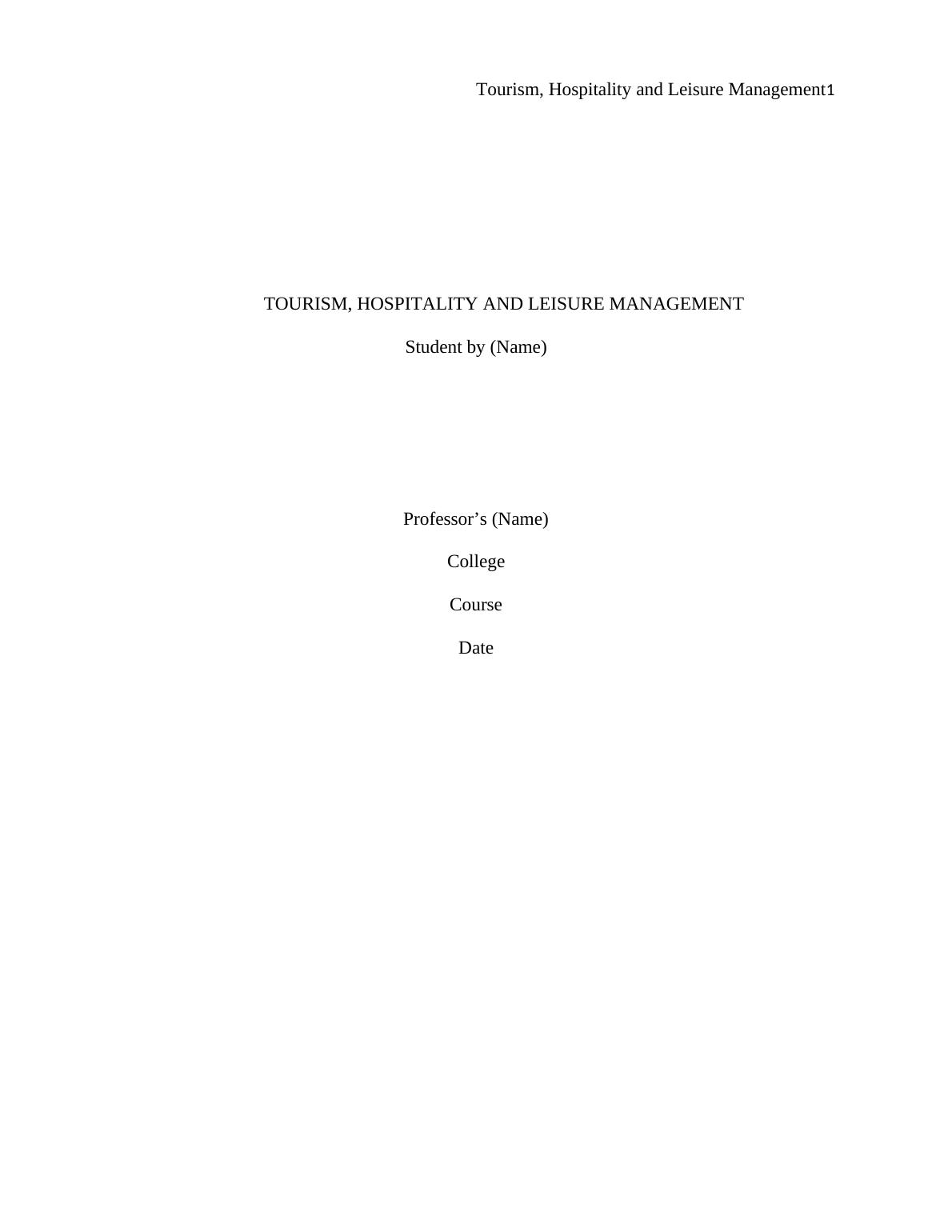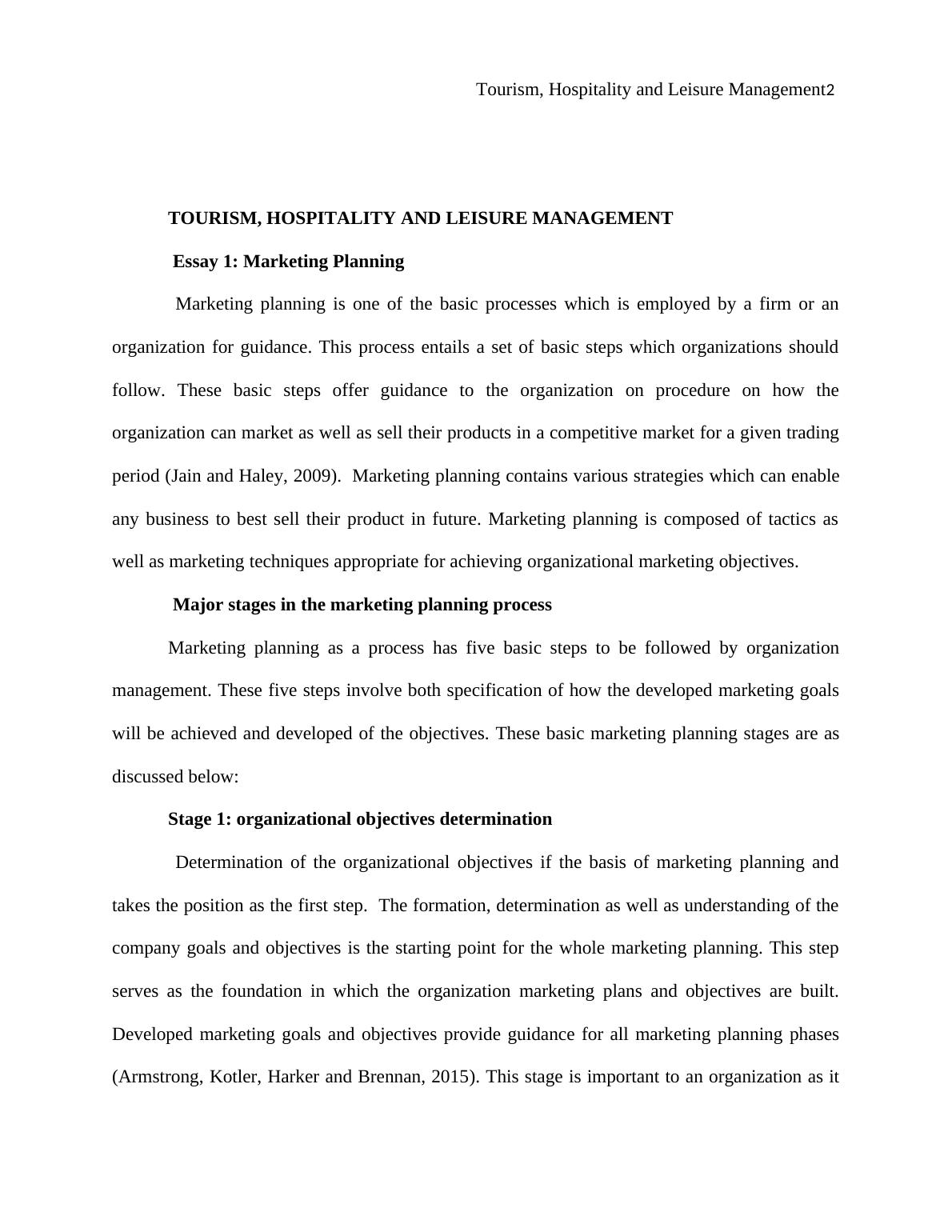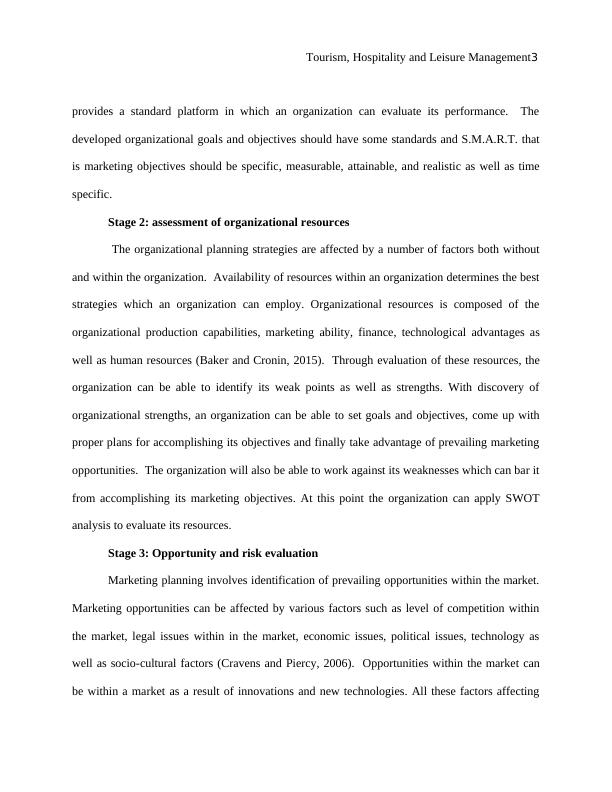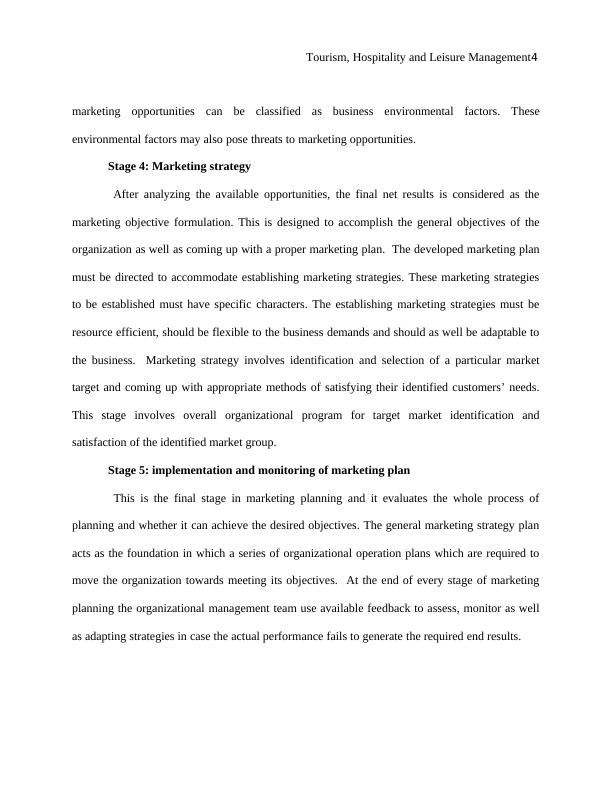Ask a question from expert
Tourism, Hospitality and Leisure Management
17 Pages4553 Words85 Views
Added on 2020-04-21
Tourism, Hospitality and Leisure Management
Added on 2020-04-21
BookmarkShareRelated Documents
Tourism, Hospitality and Leisure Management1
TOURISM, HOSPITALITY AND LEISURE MANAGEMENT
Student by (Name)
Professor’s (Name)
College
Course
Date
TOURISM, HOSPITALITY AND LEISURE MANAGEMENT
Student by (Name)
Professor’s (Name)
College
Course
Date

Tourism, Hospitality and Leisure Management2
TOURISM, HOSPITALITY AND LEISURE MANAGEMENT
Essay 1: Marketing Planning
Marketing planning is one of the basic processes which is employed by a firm or an
organization for guidance. This process entails a set of basic steps which organizations should
follow. These basic steps offer guidance to the organization on procedure on how the
organization can market as well as sell their products in a competitive market for a given trading
period (Jain and Haley, 2009). Marketing planning contains various strategies which can enable
any business to best sell their product in future. Marketing planning is composed of tactics as
well as marketing techniques appropriate for achieving organizational marketing objectives.
Major stages in the marketing planning process
Marketing planning as a process has five basic steps to be followed by organization
management. These five steps involve both specification of how the developed marketing goals
will be achieved and developed of the objectives. These basic marketing planning stages are as
discussed below:
Stage 1: organizational objectives determination
Determination of the organizational objectives if the basis of marketing planning and
takes the position as the first step. The formation, determination as well as understanding of the
company goals and objectives is the starting point for the whole marketing planning. This step
serves as the foundation in which the organization marketing plans and objectives are built.
Developed marketing goals and objectives provide guidance for all marketing planning phases
(Armstrong, Kotler, Harker and Brennan, 2015). This stage is important to an organization as it
TOURISM, HOSPITALITY AND LEISURE MANAGEMENT
Essay 1: Marketing Planning
Marketing planning is one of the basic processes which is employed by a firm or an
organization for guidance. This process entails a set of basic steps which organizations should
follow. These basic steps offer guidance to the organization on procedure on how the
organization can market as well as sell their products in a competitive market for a given trading
period (Jain and Haley, 2009). Marketing planning contains various strategies which can enable
any business to best sell their product in future. Marketing planning is composed of tactics as
well as marketing techniques appropriate for achieving organizational marketing objectives.
Major stages in the marketing planning process
Marketing planning as a process has five basic steps to be followed by organization
management. These five steps involve both specification of how the developed marketing goals
will be achieved and developed of the objectives. These basic marketing planning stages are as
discussed below:
Stage 1: organizational objectives determination
Determination of the organizational objectives if the basis of marketing planning and
takes the position as the first step. The formation, determination as well as understanding of the
company goals and objectives is the starting point for the whole marketing planning. This step
serves as the foundation in which the organization marketing plans and objectives are built.
Developed marketing goals and objectives provide guidance for all marketing planning phases
(Armstrong, Kotler, Harker and Brennan, 2015). This stage is important to an organization as it

Tourism, Hospitality and Leisure Management3
provides a standard platform in which an organization can evaluate its performance. The
developed organizational goals and objectives should have some standards and S.M.A.R.T. that
is marketing objectives should be specific, measurable, attainable, and realistic as well as time
specific.
Stage 2: assessment of organizational resources
The organizational planning strategies are affected by a number of factors both without
and within the organization. Availability of resources within an organization determines the best
strategies which an organization can employ. Organizational resources is composed of the
organizational production capabilities, marketing ability, finance, technological advantages as
well as human resources (Baker and Cronin, 2015). Through evaluation of these resources, the
organization can be able to identify its weak points as well as strengths. With discovery of
organizational strengths, an organization can be able to set goals and objectives, come up with
proper plans for accomplishing its objectives and finally take advantage of prevailing marketing
opportunities. The organization will also be able to work against its weaknesses which can bar it
from accomplishing its marketing objectives. At this point the organization can apply SWOT
analysis to evaluate its resources.
Stage 3: Opportunity and risk evaluation
Marketing planning involves identification of prevailing opportunities within the market.
Marketing opportunities can be affected by various factors such as level of competition within
the market, legal issues within in the market, economic issues, political issues, technology as
well as socio-cultural factors (Cravens and Piercy, 2006). Opportunities within the market can
be within a market as a result of innovations and new technologies. All these factors affecting
provides a standard platform in which an organization can evaluate its performance. The
developed organizational goals and objectives should have some standards and S.M.A.R.T. that
is marketing objectives should be specific, measurable, attainable, and realistic as well as time
specific.
Stage 2: assessment of organizational resources
The organizational planning strategies are affected by a number of factors both without
and within the organization. Availability of resources within an organization determines the best
strategies which an organization can employ. Organizational resources is composed of the
organizational production capabilities, marketing ability, finance, technological advantages as
well as human resources (Baker and Cronin, 2015). Through evaluation of these resources, the
organization can be able to identify its weak points as well as strengths. With discovery of
organizational strengths, an organization can be able to set goals and objectives, come up with
proper plans for accomplishing its objectives and finally take advantage of prevailing marketing
opportunities. The organization will also be able to work against its weaknesses which can bar it
from accomplishing its marketing objectives. At this point the organization can apply SWOT
analysis to evaluate its resources.
Stage 3: Opportunity and risk evaluation
Marketing planning involves identification of prevailing opportunities within the market.
Marketing opportunities can be affected by various factors such as level of competition within
the market, legal issues within in the market, economic issues, political issues, technology as
well as socio-cultural factors (Cravens and Piercy, 2006). Opportunities within the market can
be within a market as a result of innovations and new technologies. All these factors affecting

Tourism, Hospitality and Leisure Management4
marketing opportunities can be classified as business environmental factors. These
environmental factors may also pose threats to marketing opportunities.
Stage 4: Marketing strategy
After analyzing the available opportunities, the final net results is considered as the
marketing objective formulation. This is designed to accomplish the general objectives of the
organization as well as coming up with a proper marketing plan. The developed marketing plan
must be directed to accommodate establishing marketing strategies. These marketing strategies
to be established must have specific characters. The establishing marketing strategies must be
resource efficient, should be flexible to the business demands and should as well be adaptable to
the business. Marketing strategy involves identification and selection of a particular market
target and coming up with appropriate methods of satisfying their identified customers’ needs.
This stage involves overall organizational program for target market identification and
satisfaction of the identified market group.
Stage 5: implementation and monitoring of marketing plan
This is the final stage in marketing planning and it evaluates the whole process of
planning and whether it can achieve the desired objectives. The general marketing strategy plan
acts as the foundation in which a series of organizational operation plans which are required to
move the organization towards meeting its objectives. At the end of every stage of marketing
planning the organizational management team use available feedback to assess, monitor as well
as adapting strategies in case the actual performance fails to generate the required end results.
marketing opportunities can be classified as business environmental factors. These
environmental factors may also pose threats to marketing opportunities.
Stage 4: Marketing strategy
After analyzing the available opportunities, the final net results is considered as the
marketing objective formulation. This is designed to accomplish the general objectives of the
organization as well as coming up with a proper marketing plan. The developed marketing plan
must be directed to accommodate establishing marketing strategies. These marketing strategies
to be established must have specific characters. The establishing marketing strategies must be
resource efficient, should be flexible to the business demands and should as well be adaptable to
the business. Marketing strategy involves identification and selection of a particular market
target and coming up with appropriate methods of satisfying their identified customers’ needs.
This stage involves overall organizational program for target market identification and
satisfaction of the identified market group.
Stage 5: implementation and monitoring of marketing plan
This is the final stage in marketing planning and it evaluates the whole process of
planning and whether it can achieve the desired objectives. The general marketing strategy plan
acts as the foundation in which a series of organizational operation plans which are required to
move the organization towards meeting its objectives. At the end of every stage of marketing
planning the organizational management team use available feedback to assess, monitor as well
as adapting strategies in case the actual performance fails to generate the required end results.

End of preview
Want to access all the pages? Upload your documents or become a member.
Related Documents
Strategic Marketing Planning for Tescolg...
|15
|4332
|348
Strategic Planning Assignment - (Doc)lg...
|15
|4833
|177
Managing and Running a Small Businesslg...
|7
|3214
|1
Marketing and Business for the service sectorlg...
|7
|1343
|417
(solved) Strategic Planning for Tourism and Leisurelg...
|15
|5063
|351
Roles and Responsibilities of Marketing Functions in Travel and Tourismlg...
|12
|3347
|47